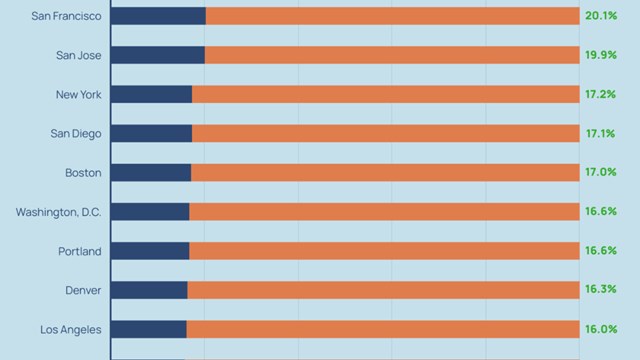
For the first time since Fiscal Year (FY) 2001, New Jersey's state budget does not rely on tax or fee increases. Gov. Jon S. Corzine signed a $33.47 billion state budget for FY 2008 that is committed to no new taxes, substantial tax relief and serious protection for the most vulnerable members of society.
"This Fiscal Year (FY) 2008 budget spends only what we can pay for, provides new efficiencies and savings, eschews the tricks and gimmicks of budgets past and upholds our commitments to the most vulnerable in our state and society," said Corzine.
Above all, the FY 2008 budget provides New Jersey citizens with considerable property tax relief. The budget reflects an increase of nearly $2 billion to the state's property tax relief programs and includes an additional $300 million in tax savings to businesses and working families.
Property Tax Relief
At the core of the budget is a $16.8 billion rebate dedicated to property tax relief for New Jersey homeowners and tenants. This figure represents almost half of the entire budget.
Corzine has allotted nearly $3 billion in direct relief for more than three million homeowner and tenant households. Accounting for the bulk of that $3 billion is the new $2.25 billion property tax relief program that was enacted in April. Under this program nearly two million families will receive an average rebate of $1,000. This triples what they received last year.
Roughly 550,000 non-senior tenants with incomes less than 50,000 will see their rebates increase from $75 to $200 and $350 according to their income. The budget also includes the Senior Property Tax Freeze program, which will provide an average benefit of $931 for about 164,000 eligible senior homeowners.
"In addition to the relief this budget provides directly to homeowners and tenants, it also holds down New Jersey's aggregate property tax bill by nearly $14 billion through the state's assumption of certain local costs and by aiding municipalities, counties, school districts, and other local governments," Corzine stated.
School and Municipal Aid
In providing nearly $11 billion in aid to local school districts, Corzine plans to ensure a quality education and help control property taxes. "Every school district in the state will be receiving at least a three percent increase in aid, which is the first major increase for the non-Abbott districts in three years, and the largest dollar increase since FY 2000," said Corzine.
The budget designates $67 million to fund a new program that will aid students in low-income districts, $26 million to support school districts that provide full-day kindergarten and $10 million to improve the quality of preschool programs in non-Abbott districts.
In addition the budget provides nearly $2.9 billion in aid to municipalities, counties and other local governments. This figure is up $152 million from the adjusted FY 2007 level. Direct aid to municipalities represents nearly $2 billion of that $2.9 billion.
Protecting the Vulnerable
Acknowledging New Jersey's need for additional support in acute care hospitals, the FY 2008 budget provides $716 million in state and federal funds for Charity Care. This year, the Commission on Rationalizing Health Care Resources, which Corzine created by Executive Order, will evaluate and discuss the financial condition of New Jersey hospitals in order to uphold a state health care system that is affordable, accessible, cost-effective and of high quality. "I look forward to receiving its recommendations on strengthening our hospital system and expect that they will inform my FY 2009 budget proposal," Corzine said.
Other significant elements of the budget include $40 million in new funding for a three percent cost of living adjustment to the community provider organizations that supply service to the most susceptible members of society. In addition, $30 million in new funding will be designated to community programs that support individuals with developmental disabilities or mental illness. A sum of $10 million will help fund stem cell research grants. About $5 million each will be assigned to confront the needs of the autism community and improve access to health care for children. In an effort to make it possible for adults with physical disabilities to work, attend school and engage in their communities, the budget is providing $3.5 million to abolish the waiting list for the Personal Assistance Service program.
No New Taxes
Aside from the property tax relief, Corzine notes a new law that expands the Earned Income Tax Credit program for about 300,000 working families. Under this law, these families will receive $36 million in tax relief.
The budget also cuts corporate business taxes by $275 million, possibly stimulating economic growth in FY 2008. "Specifically, it allows the alternative minimum assessment, net operating loss, and subchapter S provisions of the 2002 Corporation Business Tax reforms to expire," explained Corzine. "In addition, we have repealed the sales tax on memberships at non-profit health clubs, saving taxpayers an additional $20 million next year."
The $33.47 billion state budget, reduces state spending by more than $10 million. According to Corzine, it confirms a commitment to property tax relief, provides new efficiencies, and upholds a commitment to the most vulnerable in the state and society.
"Moreover," Corzine surmised, "it was proposed, debated, and passed with unprecedented transparency and on time."
Kelly Miner is an editorial assistant with The New Jersey Cooperator.






Comments
Leave a Comment